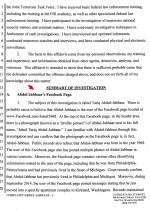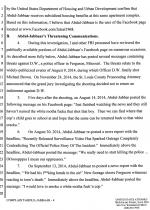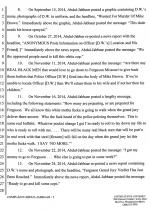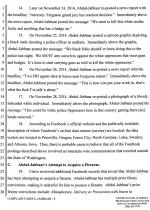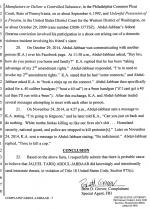Man Busted For Threats Against Ferguson Cop
Ex-con's Facebook page eyed Michael Brown's killer
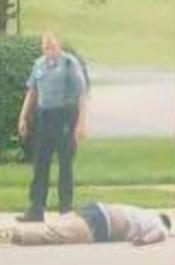
View Document
DECEMBER 2---The FBI has arrested an ex-con for allegedly posting a series of Facebook death threats against police, including the Ferguson, Missouri cop who killed teenager Michael Brown, according to court records.
Jaleel Tariq Abdul-Jabbaar, 46, is accused in a three-count felony complaint of making interstate threats against Officer Darren Wilson and  his family. While posting threats to his Facebook page, Abdul-Jabbaar was simultaneously trying to acquire a firearm, prosecutors allege.
his family. While posting threats to his Facebook page, Abdul-Jabbaar was simultaneously trying to acquire a firearm, prosecutors allege.
Abdul-Jabbaar, a Kirkland, Washington resident, has several prior felony convictions and is unable to legally possess a gun. His rap sheet includes convictions for selling crack cocaine, domestic violence, weapons possession, and assaulting an individual who sought to attend his mosque.
Pictured at right, Abdul-Jabbaar also was once found guilty of drugging and having “indecent contact” with an underage female victim who suffered from mental illness, according to court files.
In a November 11 Facebook message cited by FBI Agent Brett Grover, Abdul-Jabbaar allegedly wrote, “Are there any REAL BLACK MEN that would love to go down to Ferguson Missouri to give back those bullets that [Wilson] fired into the body of Mike Brown.” The message concluded, “If we’re unable to locate [Wilson] then We’ll return them to his wife and if not her then his children.”
On November 24, the day that a grand jury decided not to charge Wilson in connection with the August shooting of Brown, Abdul-Jabbaar posted a photo of the cop on his Facebook page along with the message “Ready to go and kill some cops,” Agent Grover reported. A second Facebook post that day about Wilson included the message “We need to kill this white motha fucka and anything that has a badge on.”
Earlier posts to Abdul-Jabbaar’s Facebook page mused about tracking down Wilson’s child and killing Wilson (seen below) and other officers. “I would love to smoke a white  motha fuck’n cop,” a September 13 posting noted.
motha fuck’n cop,” a September 13 posting noted.
Beginning in late-October, investigators charge, Abdul-Jabbaar began communicating with another man via Facebook in an attempt to procure a handgun. “I’m in need to invoke my 2nd amendment rights,” Abdul-Jabbaar declared in an October 29 message. The convicted felon sought either a 9mm or .40-caliber handgun.
If convicted of making the Facebook threats, Abdul-Jabbaar faces a maximum of five years in prison on each of the three counts. Abdul-Jabbaar is locked up in advance of a December 5 detention hearing in U.S. District Court in Seattle.
Born William Cox, Abdul-Jabbaar changed his name in 1990 upon converting to Islam. A father of three, he has been divorced several times, according to court records.
Abdul-Jabbaar’s last felony case came in 2008, when he was collared for engaging in a street shootout with another man. He later pleaded guilty to a federal weapons charge and was sentenced to a year in prison and three years probation.
At the time of Abdul-Jabbaar’s arrest, his lawyer contended that federal prosecutors took over the gun case from their state counterparts as a way to pressure Abdul-Jabbaar to testify as a government witness in a terrorism case in New York City.
In a sealed court filing, attorney Howard Ratner noted that, in 1997, Abdul-Jabbaar was a member of a Seattle mosque “when two Al Qaeda operatives came here and started a training camp in Oregon.” One of the Al Qaeda members, Ratner wrote, had been extradited to New York for trial, while the second alleged terrorist was in custody in London awaiting extradition to the U.S.
While contending that Abdul-Jabbaar “had no involvement with the training camp” in Bly, Oregon, Ratner told prosecutors that his client was willing to cooperate with federal investigators. Ratner added that in return for Abdul-Jabbaar’s cooperation--the scope of which was not detailed--prosecutors pledged to file a motion seeking leniency in the weapons case.
Court files and news clippings, however, contain no indication that Abdul-Jabbaar ever appeared as a government witness. (5 pages)

